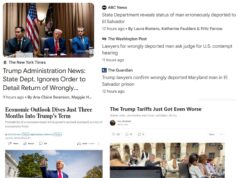( – promoted by lowkell)
When I was a law student working at the U.S. EPA in the ’80s, we sued a company that had been polluting a Maine river for years. Back then, EPA calculated penalties based on the amount of money a polluter saved by ignoring the requirements of the Clean Water Act. The idea was to take away the economic benefit of pollution so that companies would make out better by installing treatment systems than by imposing their toxic waste on the community.
Not surprisingly, the company’s lawyers tried to prevent their client from having to pay a penalty for all those years it had been dumping pollution into the river. But their reasoning was interesting. Faced with the lawsuit, the company overhauled its industrial process and eliminated most of its waste products, which turned out to be a money-saving move. Thus, said the lawyers, the company hadn’t gained any competitive advantage by polluting the river; it had actually lost money doing so. Really, they’d have made a lot more money if we’d forced them to clean up their act sooner.
Needless to say, the argument didn’t fly, and the company paid a fine. But its experience turns out to have been a common one. When it comes to environmental regulation, industry screams that the sky is falling, but then it gets to work to solve the problem, and frequently ends up stronger than ever.
This is one reason to be skeptical of ad campaigns from the U.S. Chamber of Commerce and the National Mining Association trying to convince the public that the EPA’s new regulations on carbon pollution from power plants, to be announced on June 2, will destroy the American economy. They’ve cried wolf so many times they have lost all credibility.
And in case you are of a generous nature and inclined to forgive previous false alarms, it’s worth noting that the National Mining Association campaign earned the maximum four Pinocchios from the Washington Post fact-checker-meaning, it’s a pack of lies. The EPA has been scarcely kinder in its analysis of the Chamber’s campaign, and the economist Paul Krugman says the Chamber’s own numbers actually prove compliance with the carbon rule will be cheap.
At least we can understand the American Mining Association’s fabricating facts. These are coal mining companies, after all; of course they are opposed to limits on carbon! They’re like the tobacco companies fighting limits on smoking. In fact, they’re in a worse position, because a good many smokers say they like tobacco, whereas nobody who isn’t making money from it likes coal.
But we can’t cut the Chamber the same kind of slack. There is little reason to fear the economy will suffer by continuing the gradual phase-out of coal that is already underway. No one was building new coal plants anyway; they are too expensive compared to natural gas plants and wind farms. The old, dirty, but fully amortized coal plants will gradually be retired, and good riddance. We have paid dearly for that “cheap” power in health care for asthma and heart disease, in premature deaths, and in babies born with neurological damage from mercury in their mothers’ bodies.
Nor does the Chamber’s anti-carbon rule stance accurately reflect the opinions of the energy sector as a whole. Even those electric utilities that once relied heavily on coal have proven to be fickle friends. Many of them have already said they can live with a carbon rule that lets them swap fuel sources.
And while coal declines, other energy industries are growing and flourishing. The breathtaking pace of advances in wind, solar and battery technologies make it clear that the age of fossil fuels will end in this century. There will be winners and losers, as there always are in a free market, but the new energy economy offers so many opportunities for American companies and workers that one wishes the fear-mongers at the Chamber would stretch their necks out of their bunker far enough to see the horizon.
As for society in general, we have seldom seen a limit on pollution that didn’t make us collectively better off, and carbon will be no exception. It is always easier and cheaper to stop pollution at its source than to clean it up later or pay for the damage. That will be true here in spades, where the damage includes hotter summers, more crop losses, more disease, more destructive storms, and whole communities swamped by rising sea levels. These are already happening, and they affect both our health and our wallets. Failing to limit carbon condemns us all to economic decline and slow self-destruction.
Surely, all we have to fear about the EPA’s upcoming carbon rule is that it might not be strong enough.



 Sign up for the Blue Virginia weekly newsletter
Sign up for the Blue Virginia weekly newsletter







![As Sam Shirazi Points Out It Now “seems official…[Sen. Mark] Warner is running for re-election in 2026.” Here Are a Few Thoughts.](https://bluevirginia.us/wp-content/uploads/2025/04/shirazisecret-100x75.jpg)
